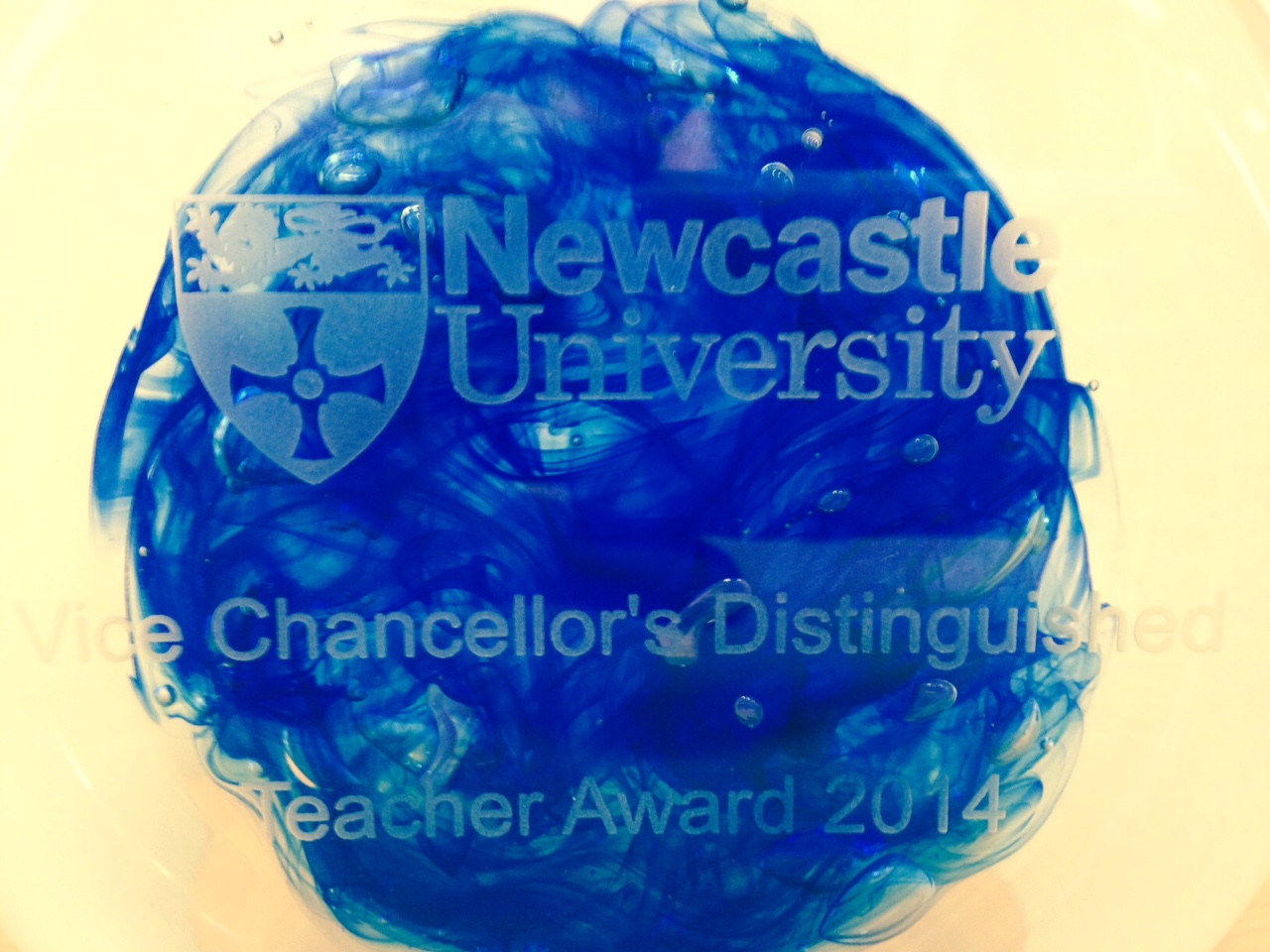The Vice-Chancellor’s Education Excellence Awards aim to raise the status of education at Newcastle University by rewarding individuals and teams who have made a marked impact on the student’s educational experience.
The 2025 winners have now been announced, with five winning submissions out of a very competitive field of nominations.
Congratulations to the 2025 winners of the Vice-Chancellor’s Education Excellence Awards:
Dr JC Penet
School of Modern Languages

Dr JC Penet receives his award for his innovative and sustained contributions to the field of Modern Languages, in particular within the School’s Translation and Interpreting Section. In recent years, Dr Penet has successfully built a profile as an influential scholar and practitioner in translator education that has benefited Newcastle University, but also students and colleagues more widely through his engagement with coaching and mentoring practices. The awarding panel were impressed with how the winnings from Dr Penet’s previous Vice Chancellor’s award were used to reinvest in training that has led to the development of Translation and Interpreting Studies within the School of Modern Languages.
JC told us “I’m truly honoured to receive the Vice-Chancellor’s Education Excellence Award for a second time. This recognition means a great deal to me, as it reflects my unwavering commitment to co-creating, with our fantastic students and brilliant professional services colleagues (Careers, LTDS), experiential learning opportunities that make education more authentic and situated by connecting students with real-world industry practice. It’s a privilege to support students in developing the critical, analytical and reflective skills they’ll need to thrive in their future working lives. I’ve also found it incredibly rewarding to see how my research into emotional intelligence in translator training has contributed to their growth and wellbeing. Too often, education begins from a place of deficit. It doesn’t have to—and I’d like to believe that my work, both as an educator and a life coach, is helping to challenge this. Change and innovation are never easy, but what a joy it is to help shape empowering learning experiences that allow students to rediscover just how creative and resourceful they truly are.”
Bridging the Gap
Academic Services – Library
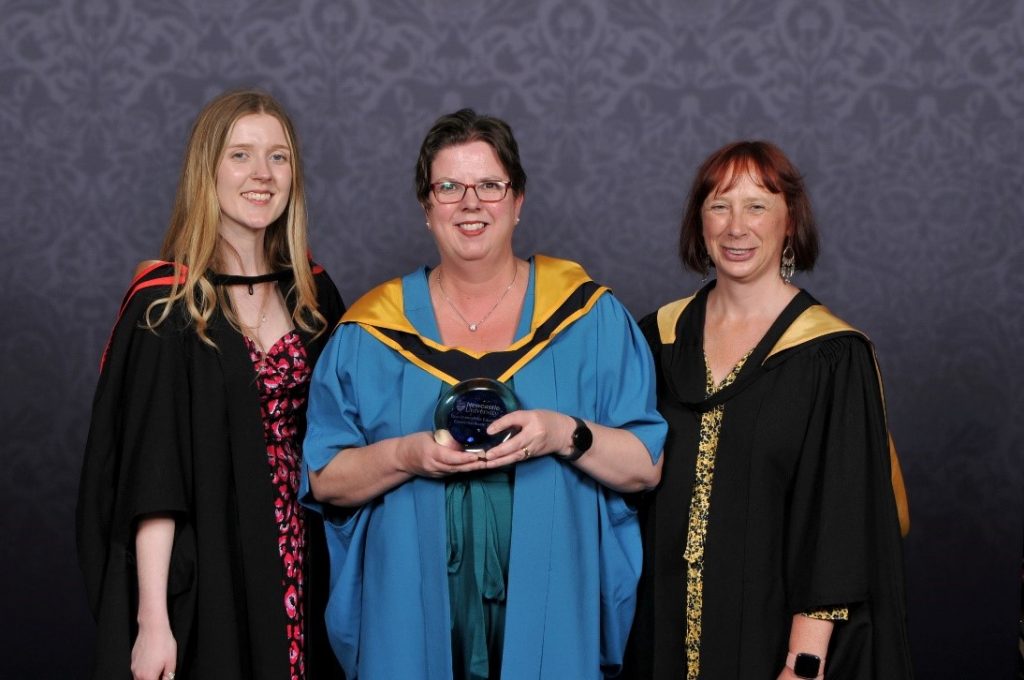
Pictured: Lauren Aspery, Liv Jonassen and Sara Bird
The Bridging the Gap Team, who have representation from the Library, the Learning and Teaching Development Service, as well as Undergraduate and Postgraduate Interns, receive their award for their engagement with local schools, prospective students, academic colleagues, and our own first year students, in order to support new students transitioning into their university studies. The awarding panel noted that all of the university’s values are well embedded in the team’s approach, and that the project has visibly strengthened the Newcastle University transition offering. There is also a real possibility for opportunities and expansion for individual, international, and mature students in the future.
The team fed back to us “We are delighted that our ongoing commitment to combat the challenges faced by students transitioning into university has been recognised by this award. It is testament to the meaningful and compassionate collaboration that took place throughout Bridging the Gap, the expertise and dedication of our project team, and the hard work of the talented and insightful students we partnered with, without whom none of this would have been possible.” – Lauren Aspery, Project Co-ordinator
“This award celebrates the long-term partnerships that have formed as a result of this work, and our collective commitment to make our university accessible for all students. Sharing expertise across teams has enabled us to provide high-quality, bespoke support for students who are struggling with their studies in those early stages, setting them up for success in the future.”- Liv Jonassen, Academic Skills Team Manager
“It is a privilege to be acknowledged for our contribution to supporting and empowering students to succeed. Having these resources means we are greater equipped to support students with all of the essential study skills they need to complete their A-Levels and transition smoothly into their degree studies with confidence, furthering our mission to provide equity of access to higher education.” - Sara Bird, Education Outreach Officer
Loyola Study Abroad Centre
International Office
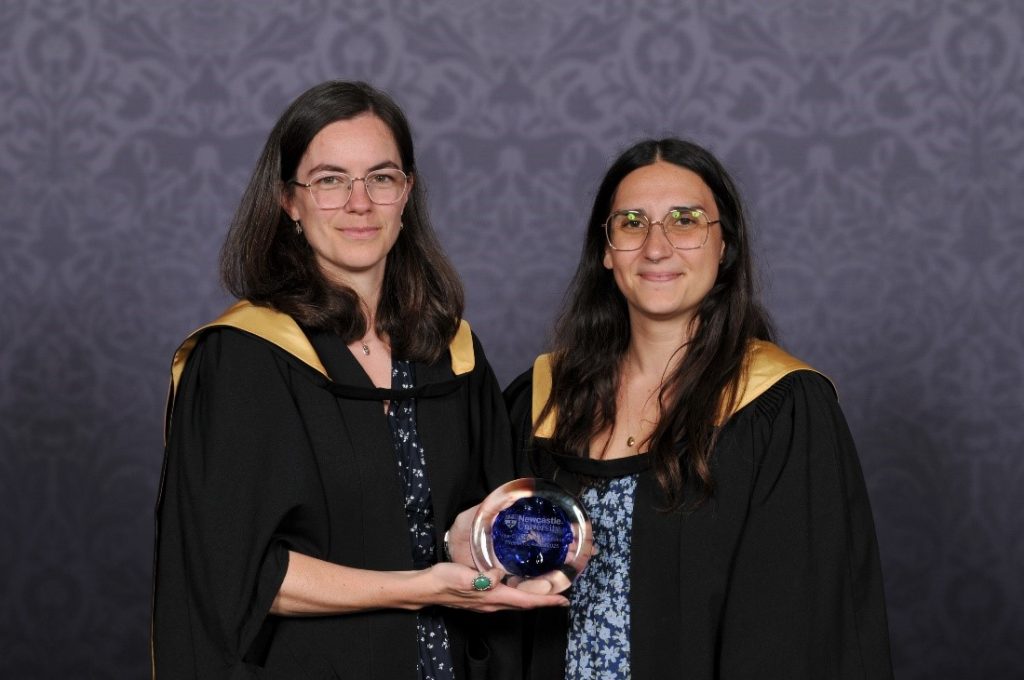
Pictured: Grace Baker and Dina Schwartz
Loyola Study Abroad Centre, part of the International Office, receives their award for significantly enhancing the educational experience of both students and colleagues at Newcastle and Loyola University, Maryland, through its innovative programme of dedicated support. It is evident the team have gone above and beyond to ensure Loyola students are happy during their time at Newcastle. The panel also acknowledges that this huge team effort has been working together for the benefit of the two institutions for 30 years, and that this award is a recognition of that group effort and the history of the centre. In addition, the project’s civil engineering accreditation is very innovative and offers a model for future collaborations
Grace explained “The relationship with Loyola University Maryland is a special and enduring partnership – celebrating 30 years in 2025. I’ve been the Center Manager for ten of those, and it is a role that never grows tired: watching students’ personal transformation each semester, providing support and structure to see them flourish. We’ve also developed innovative programming, which is possible when you work with a forward-thinking partner like Loyola, who also deeply care about the opportunities an international education brings. Thank you for this award, and a special ‘thank you’ to every school and team across the universities that contribute to the success of the Center.”
Initial Teacher Education
School of Education, Communication & Language Science
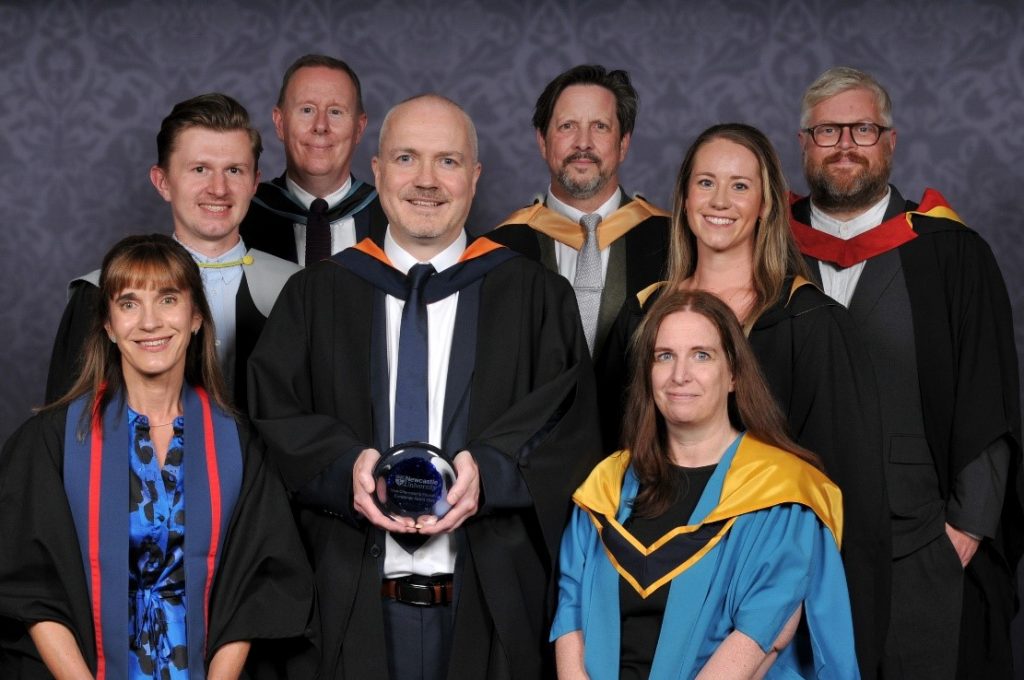
Pictured: (Left to Right) Fiona Hepton, Christian Kitson, Andrew O’Sullivan, Fred Clark, Jon Haines, Susan O’Hagan, Hayley Hands and Chris Blakey
The Initial Teacher Education team from the school of Education, Communication and Language Sciences, receive this award for successfully leading a rigorous, three-year reaccreditation process following the DfE ITE Market Review (from July 2021 to July 2024). This process required all ITE providers to develop detailed curricula for student teachers and school-based mentors, ensuring that training systematically and consistently drew upon the latest high-quality research on teaching and learning. The team’s leadership resulted in a successful reaccreditation, affirming the University’s status as a leading provider of ITE.
The team commented the following;
Fiona: “We are incredibly proud that the Initial Teacher Education Programme has been recognised with this award. It’s a testament to the dedication of our team and partner schools in preparing the next generation of outstanding teachers for both primary and secondary education. At the heart of our work is a deep commitment to supporting trainees as they begin their journey into the profession, ensuring they are well-equipped to make a meaningful impact in classrooms across our region and beyond. At a time when the education sector faces significant challenges in teacher recruitment and retention, the success of our ITE provision is more important than ever. We are proud to be playing a vital role in attracting and nurturing passionate, skilled teachers who are so urgently needed in our schools.”
Jon: “We are delighted to be recognised for our work in enhancing the quality and reach of our initial teacher education programmes at Newcastle University. As the lead partner in a growing collaboration with Durham University, we are extending our impact even further across the region and are proud not only to deliver training that meets the rigorous standards set by the DfE and Ofsted, but also to provide our local schools with some of the very best Early Career Teachers.”
Fred: We are deeply honoured to receive the Vice-Chancellor’s Education Excellence Award, which recognises the sustained commitment, innovation, and impact of our Initial Teacher Education programmes. This achievement is a testament to the extraordinary dedication of our team, our partner schools, and our collaboration with Durham University in preparing the next generation of outstanding teachers for both primary and secondary education. From navigating rigorous reaccreditation and inspection processes to expanding our regional reach, our team has consistently demonstrated leadership, resilience, and an unwavering focus on quality and equity. We are proud to be shaping a diverse and passionate teaching workforce that is making a real difference in classrooms across our region and beyond.
Business in Action Team
Newcastle University Business School
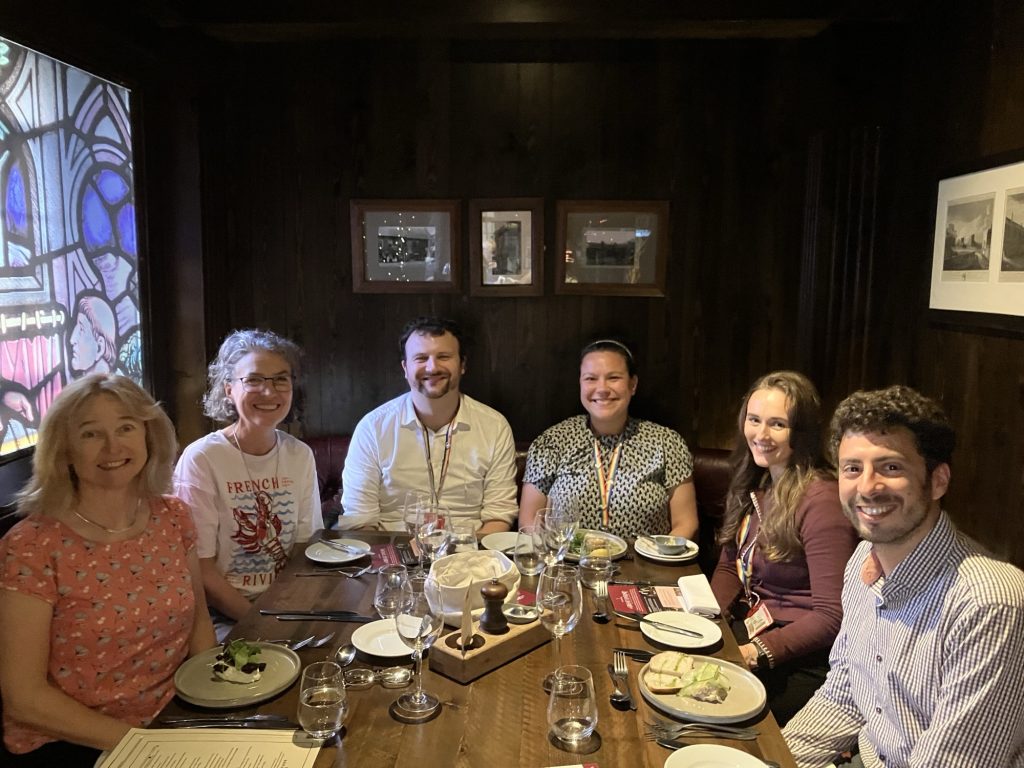
Pictured: (Left to Right) Jo Clark, Dr Lucy Hatt, Cian O’Sullivan, Jaclyn Wright, Keira Iveson and Steven Sadi. The award will be presented at a winter congregation ceremony.
The Business in Action team, from Newcastle University Business School, receive this award for their transformative work designing and delivering an immersive, experiential learning module for our MBA that bridges the gap between academic theory and real-world practice. The awarding panel found their student-centered offer, and the active learning approach taken, has had an exceptional impact on student learning. The panel also commended the team’s work developing a supportive and collaborative environment for both colleagues and students to flourish within; an approach already being adopted by other programmes within the school.
Jo told us “I am delighted that the work of our team of colleagues has been recognised with the Vice Chancellor’s Education Excellence Award. The Business in Action module, a transformative experience for our MBA students, ensures students have an opportunity, working on live consultancy projects, to apply their academic skills and knowledge in practice. Working together with external learning partner organisations we bring real challenges and business experiences into the classroom. We ensure that this experience benefits not only our students, but also our enthusiastic learning partners, a range of businesses and charities with whom we work on an annual basis, such as, PWC, Lloyds Bank, Aqua Consulting, Charity Groundwork North East and Cumbria and Northumbrian Water. These strategic learning partnerships are made possible by the effective teamworking between our academics and external relations colleagues, plus, alumni relations and careers advisors. Business in Action is both an enjoyable and rewarding experience, so we find that our learning partners are pleased to return year on year to engage with business school MBA students.
Effective team work, internally and externally, underpins all of this activity making it my pleasure to lead the Business in Action, MBA module. This year we were delighted that colleagues from the School of Engineering were able to join us for final presentations. We are looking forward to extending the benefit of working with Newcastle University students by taking an even more collaborative, interdisciplinary, approach in our work with external learning partners in 2026.”
The panel, chaired by Ruth Valentine, PVC Education, were greatly impressed by the wide-ranging impact, variety of initiatives, and creative approaches to teaching and student support demonstrated by all the awardees.
For more information about the awards, and how to apply next year, please visit the Learning and Teaching @ Newcastle website


